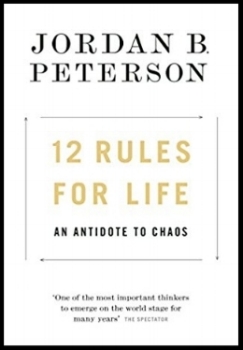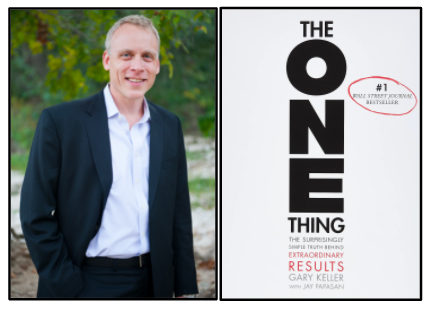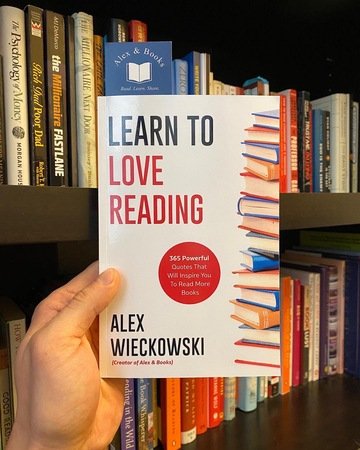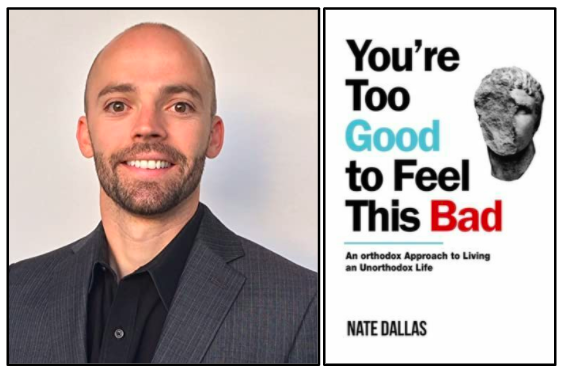Summary:
Since discovering Jordan Peterson's YouTube channel last year, I've become completely amazed by the amount of incredible information produced by this single individual. His book, "12 Rules for Life: An Antidote to Chaos" is the first book that I've ever pre-ordered in my entire life, and I've bought roughly 100 books in the last three years.
I've already written one article about "12 Rules for Life" but this book holds so much valuable information that I had to write another.
For those unfamiliar with Dr. Peterson, here is a quick intro.
Jordan B. Peterson is a Canadian clinical psychologist, cultural critic, and professor of psychology. He has taught at Harvard and the University of Toronto. Dr. Peterson specializes in personality psychology with a particular interest in the psychology of religious and ideological beliefs. He’s published more than a hundred scientific papers, transforming the modern understanding of personality, while his textbook, Maps of Meaning, revolutionized the psychology of religion.
In the past few years, Dr. Peterson has become one of the world’s most popular public thinkers due to his YouTube lectures–which has over 1 million subscribers– where he describes the deep connections between neuroscience, psychology and some of the oldest stories told by mankind.
Author Dr. Jordan B. Peterson.
In his book, 12 Rules for Life, Peterson discusses discipline, courage, and the necessity of clear, truthful thinking in order to live properly within the order and chaos of our lives.
Here are 6 profound quotes from his book.
6)
“To stand up straight with your shoulders back is to accept the terrible responsibility of life, with eyes wide open. It means deciding to voluntarily transform the chaos of potential into the realities of habitable order. It means adopting the burden of self-conscious vulnerability, and accepting the end of the unconscious paradise of childhood...It means willingly undertaking the sacrifices necessary to generate a productive and meaningful reality.”
This quote is from the first chapter of Peterson’s book (some may call it the lobster chapter), where Dr. Peterson discusses an important life lesson that can be learned from these sea-dwelling creatures.
To start, lobsters and humans have similar nervous systems and live in a dominance hierarchy. But what do lobsters have to do with standing up straight? Well, humans and lobsters share the chemical serotonin, which governs posture. When a lobster is defeated in a fight, its posture drops, it faces the ground and appears weak to others. The same thing happens to humans, and with each defeat, serotonin levels drop and so does our posture.
If a person slouches, they present themselves as defeated. However, if a person stands up straight, it means they may have taken a hit but are not defeated.
It means that you, both physically and mentally, are able and willing to move forward in life to the next challenge. It also signals to other people that you are able to handle whatever life throws your way while you pursue your rightful destiny.
Life is not easy. There will be pain and suffering. But do not let chaos bring you down. Accept the fact that this journey will not be smooth and that no matter what happens, you will take responsibility for your life and do what you can to make it better. And when negative situations occur in life that you cannot control, you will still stand up straight and not let it bring you down.
5)
“You could help direct the world, on its careening trajectory, a bit more toward heaven and a bit more away from Hell. Once having understood Hell, researched it, so to speak–particularly your own individual Hell–you could decide against going there or creating that. You could aim elsewhere. You could, in fact, devote your life to this. That would give you a Meaning, with a capital M.”
Everyone that is alive right now is part of this game that we call life. The stage that we have entered into as players was created, for the most part, by previous characters. No one gets to play this game forever, but each of us, no matter how big or small a role, contributes to the game.
Peterson believes our contributions can have one of two effects, it can either tilt the world up towards Heaven, or down towards Hell.
Hell is a topic Peterson has extensively researched–for those that don’t believe in Hell on Earth, he advises people to read about Viktor Frankl’s experiences in the Holocaust camps or Aleksandr Solzhenitsyn’s time in the Soviet slave labor camps.
After having read both of those books, it’s easy to see why Peterson preaches about moving the world towards Heaven. The horrible events that happened in those books should never again occur, and we must all do our part to make sure the world is far, far away from Hell. As Peterson says, “You could, in fact, devote your life to this.” Doing so would not only be beneficial to the world, but it would also “give you a Meaning, with a capital M.”
4)
“When the internal critic puts you down using such comparisons, here’s how it operates: First, it selects a single, arbitrary domain of comparison. Then it acts as if that domain is the only one relevant. Then it contrasts you unfavorably with someone truly stellar, within that domain. It can take that final step even further, using the unbridgeable gap between you and its target of comparison as evidence for the fundamental injustice of life. That way your motivation to do anything at all can be most effectively undermined. ”
All of us have a voice inside of our heads that no matter what we do, always has something negative to say about ourselves. Peterson calls this voice the internal critic. This critic is an expert in making us unhappy by comparing our lives to others.
Specifically, the critic operates by picking a single, arbitrary domain–say money–and then acts as if that domain is the only one that is relevant. For example, if I made $40,000 last year and my friend made twice as much, the internal critic says starts to say that I’m poor, I’m not as good, and that my life would be exponentially better if I made more money.
However, this internal critic can be easily dismissed because its logic is flawed. Each person is a unique individual that consists of a nearly infinite number of domains. It is impossible to even compare two people once two domains are given.
The book uses the example of two employees, where person A makes more money than person B. Most people would automatically say person A has the ‘better life’. But now consider that person A finds out that his wife is having an affair, whose life is better now?
It’s impossible to truly compare the lives of two individuals. There is nothing to gain, it is simply waste of time and energy. Instead, focus on improving your own life and making it as good as possible.
"Psst, hey kid...you looking for some order and responsibility?"
3)
“The first step, perhaps, is to take stock. Who are you? When you buy a house and prepare to live in it, you hire an inspector to list all its faults–as it is, in reality, now, not as you wish it could be. You’ll even pay him for the bad news. You need to know. You need to discover the home’s hidden flaws. You need to know whether they are cosmetic imperfections or structural inadequacies. You need to know because you can’t fix something if you don’t know it’s broken–and you’re broken. You need an inspector. The internal critic–it could play that role, if you could get it on track; if you and it could cooperate.”
Now that you have the internal critic under control, it is time to put it to work and use it to your advantage. The critic should the play role of an inspector examining a home. It should look at the interior and exterior imperfections and identify what can be fixed and what cannot.
It can be tempting to skip this step, but ignoring a hole in a wall does not make it go away. The same can be said of people. Identify what areas, both physically and mentally, you may need to inspect and repair.
It can be tricky, but try to be honest with yourself without being too harsh.
To those that may believe they are beyond repair, Jordan Peterson writes that the past is fixed, but the future is not, life can get better. Of course, not everything can be fixed tomorrow, but that doesn’t mean a person should give up.
Instead use the internal critic to identify what “you could set in order and what you would set in order–voluntarily, without resentment, even with pleasure.” Change will require action, but it is an exchange with your future self. Work today to improve your life, and you will receive a better life for your future self.
This may be a difficult step for people, so Peterson advises readers to start small and build their level of responsibility over time. Even doing small tasks will greatly improve one's life over time, similar to how compound interest in a savings account over time can lead to huge savings.
I started with small tasks such as cutting down the amount of sugar I put in my tea from two teaspoons to one, and then zero, and doing at least 30 minutes of reading each morning. Have these tasks made my life perfect? Of course not, but it has paid off. I can now drink tea without sugar and still enjoy it, and so far this year I’ve read 13 books.
So take some time to examine yourself and your life, and work on making positive changes even if the changes are small.
2)
“Why refuse to specify? Because while you are failing to define success, you are also refusing to define failure, to yourself, so that if and when you fail you won’t notice, and it won’t hurt. But that won’t work! You cannot be fooled so easily–unless you have gone very far down the road! You will instead carry with you a continual sense of disappointment in your own Being and the self-contempt that comes along with that and the increasing hatred for the world that all of that generates.”
Just as refusing to admit there is a hole in a wall does not solve the problem, refusing to define your goals does not mean failure will be avoided. Many people refrain from identifying their goals because they don’t want to admit that they've failed.
Also, when a goal is defined but isn’t achieved, it will likely cause the person pain because they haven't accomplished what they wanted. However, the alternative is much worse. If goals aren’t specified, the person will wander around in life with a dull ache of continued hopelessness and a vague sense of failure.
Instead, do the opposite and list your goals anywhere you can. Download an app on your phone or just use the To-Do feature. Even better, write down your goals in a journal or notebook.
My favorite method is to use a calendar. Each night before going to bed, I write down 3 things I want to accomplish the next day. I also write down 3 things I want to accomplish that week and that month.
It’s great because I can literally see my progress and accomplishments all in one place. If I didn’t meet a certain goal, I can always move it to a different day. I can also flip to past months and see what I’ve accomplished in prior months.
For example, I’ve been tracking how many times I work out each week. Before using my calendar, I thought I was going to the gym 5 times a week, but the truth was I was only going 3 times a week. With this new information, I started keeping track of the days I worked out and felt extremely accomplished when I looked back on my calendar and saw I worked out 5 days and had the proof in writing (If you don’t have time to go to a gym, consider making a home gym).
Does listing your goals and not achieving them suck?
Yes.
But, it also feels great when goals are accomplished. And you have the power to achieve those goals and avoid the sucky feeling of failure by simply putting in the work. You can’t have highs without the chance of having lows, you must take the risk. Trust me, the lows won’t last forever, but the ache of hopelessness from not listing goals will.
1)
“Orient yourself properly. Then–and only then–concentrate on the day. Set your sights at the Good, the Beautiful, and the True, and then focus pointedly and carefully on the concerns of each moment. Aim continually at Heaven while you work diligently on Earth. Attend fully to the future, in that manner, while attending fully to the present. Then you have the best chance of perfecting both. ”
There’s an old quote by Lewis Carroll that goes “If you don't know where you are going, any road will take you there.” So before you can take the road to help tilt the world towards Heaven, you must first orient yourself and find out exactly where you are in the world. Then, and only then, can you work on finding the right road.
Try to take the road that will make you a good and true person, and will also make the world a more beautiful place than it is today. Once you’re on this road, pay constant attention to make sure your work on Earth (the present) is leading towards Heaven (a better future). If everyone does this to the best of their abilities, perhaps one day, there could be Heaven on Earth.
Now wouldn’t that be wonderful?
Thank you for reading my article. If you're interested in getting this book, click here or on the image below!
More information about Jordan Peterson can be found below.
If I have failed to peak your interest in this book, consider this: for the past three years I’ve been a voracious reader and have read close to a total of 100 books, but I can say without a doubt in my mind, this book is in the top 3 best books I’ve ever read. Give it a chance. -Alex
If you enjoyed reading "12 Rules for Life" I recommend reading these books:
“The Power of Myth” by Joseph Campbell
“Wild at Heart” by John Eldredge
“The Gulag Archipelago” by Aleksander Solzhenitsyn
"Man’s Search for Meaning" by Viktor Frankl
Also, please consider supporting our site or signing up for our monthly newsletter. Thank you!
Reader freebies:
















